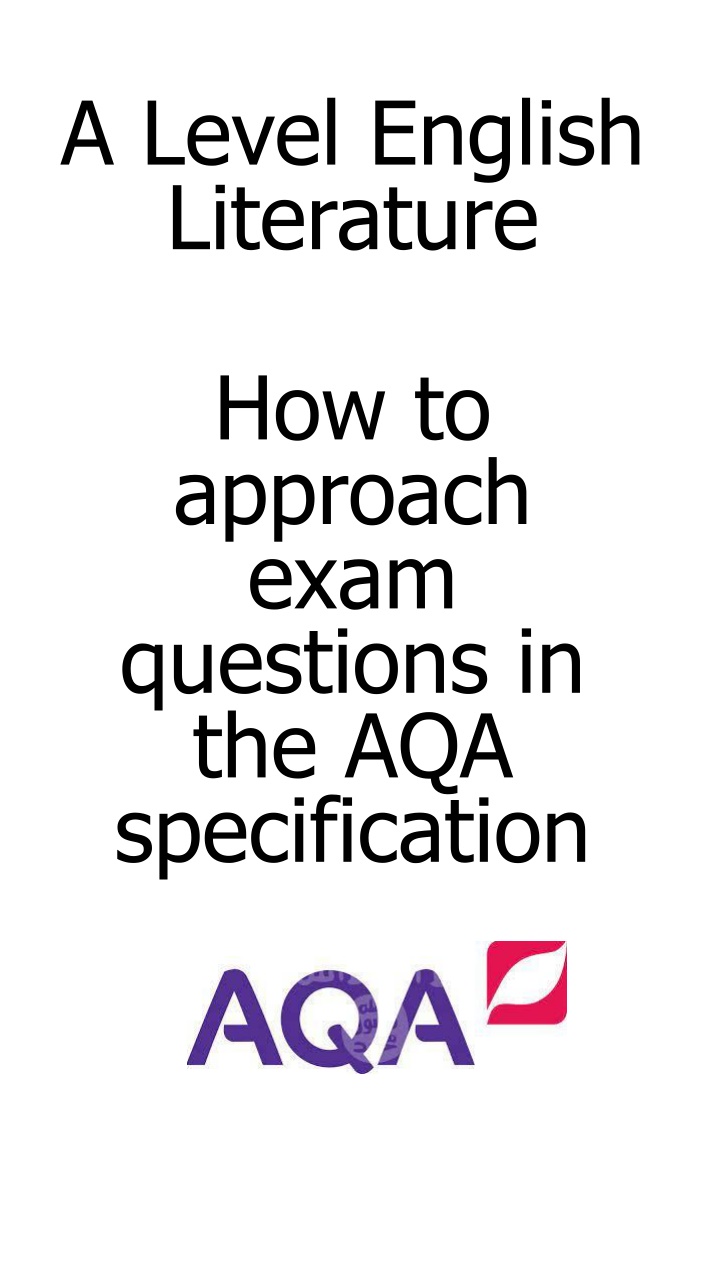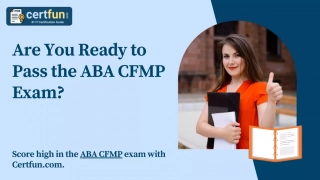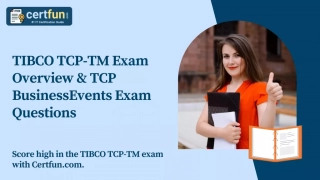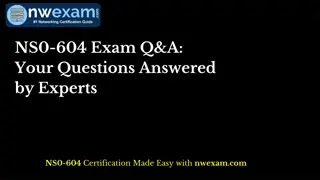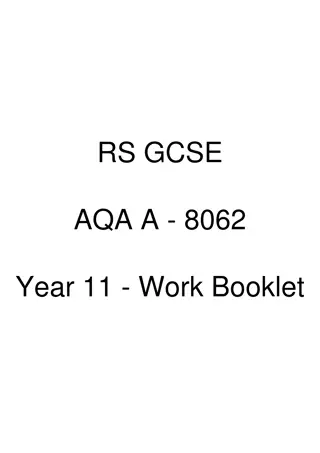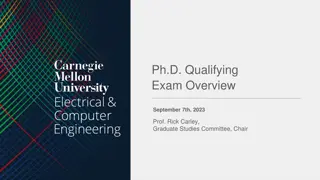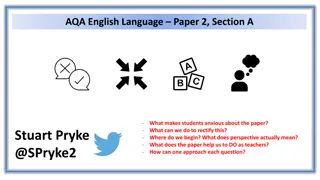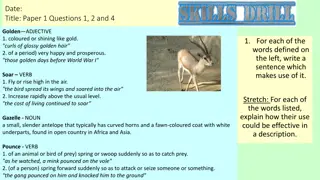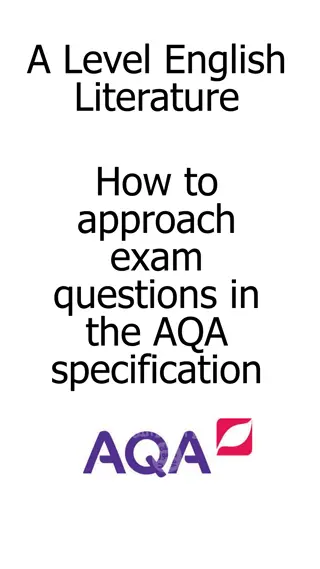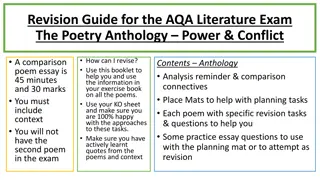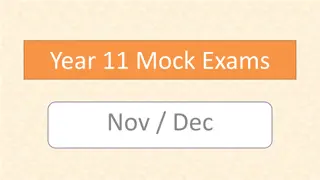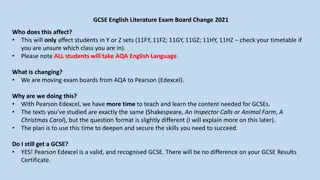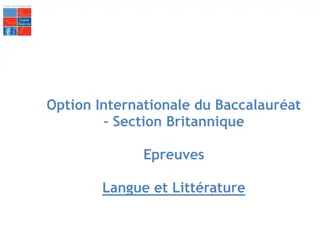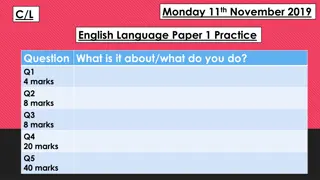Approach to Exam Questions in AQA A-Level English Literature
Learn how to effectively approach exam questions in AQA A-Level English Literature focusing on the types of questions, especially in Paper 1 (Aspects of Tragedy) and Paper 2 (Social and Political Protest Writing). Understand the significance of Shakespearean extracts, explore tragic trajectories, and grasp the narrative structure to excel in your exams.
Download Presentation

Please find below an Image/Link to download the presentation.
The content on the website is provided AS IS for your information and personal use only. It may not be sold, licensed, or shared on other websites without obtaining consent from the author.If you encounter any issues during the download, it is possible that the publisher has removed the file from their server.
You are allowed to download the files provided on this website for personal or commercial use, subject to the condition that they are used lawfully. All files are the property of their respective owners.
The content on the website is provided AS IS for your information and personal use only. It may not be sold, licensed, or shared on other websites without obtaining consent from the author.
E N D
Presentation Transcript
A Level English Literature How to approach exam questions in the AQA specification
Overview of question types Paper 1: Aspects of Tragedy Section A: Shakespeare the significance of the extract Section B - Shakespeare- to what extent do you agree? Section C writing about aspects of tragedy in two texts Paper 2: Social and Political Protest Writing Section A The unseen extract Section B choice of text - to what extent do you agree? Section C - writing about your other two texts https://www.aqa.org.uk/subjects/english/as-and-a-level/english-literature-b-7716- 7717/assessment-resources
The Shakespeare extract question Sample question Read the extract below and then answer the question. Explore the significance of this extract in relation to the tragedy of the play as a whole. Remember to include in your answer relevant analysis of Shakespeare s dramatic methods. What does the Examiners Report say about this question? In the passage based questions which ask students to explore a printed extract, students need to establish a sense of the extract s narrative and tragic trajectory, ensuring that they focus on how the passage begins, how it ends and what factually happens in it. Engaging with the dramatic narrative that is unfolding is essential, and given that we are dealing with tragedy, that engagement may well be of an emotional nature since tragedy deals with such heavy matters. If students securely see the story of the extract and place it accurately they are in a position to begin their exploration of the significance of tragic aspects. As always, where students wrote about the play as drama, responses were more engaging. Remember, this is NOT like GCSE where the extract is a springboard for ideas. Students need to carefully consider the significance of the extract in relation to the play s tragic structure. Therefore, what follows is a suggested pedagogical approach to tackling this question type.
Thinking about tragic trajectory As this is an extract question, begin by locating the extract within the text as a whole. It will be a pivotal moment: so why is it? Does it instigate or culminate a chain of events? If so, how does this link to the question? This thinking model process might help your approach to this. What happens before that culminates in this extract? What future events in this play are instigated by this scene? The chosen extract culminates = each a climax or point of highest development. instigated = bring about or initiate (an action or event). The opening paragraph, therefore, should contextualise the extract in relation to the narrative of the play (based on what we have studied thus far): Explain what recently happened in the play leading up to the extract o Summarise what the extract itself details in terms of the play s plot o Consider how this impacts on later events in the play o Evaluate what tragic elements underpin this scene o
Sample question (2017)
A sample introduction What happens before that culminates in this extract? What future events in this play are instigated by this scene? The chosen extract This extract is highly significant in relation to the tragedy of Othello it comes after Desdemona orders the Clown to find Cassio and bring him the message that she has made her suit to Othello and a subsequent discussion held between Desdemona and Emilia where they discuss the missing handkerchief. The extract itself presents Othello s suspicions of his wife s infidelity, using the prop of the handkerchief to spur his jealous thoughts further. Such jealousy leads to the later murder of Desdemona where she is smothered with a pillow. This is underpinned by the tragic elements of dramatic irony whereby the audience are acutely aware that Iago s Machiavellian manipulation of Othello in believing his wife is having an affair with Cassio, which ultimately leads to the tragic resolution of Othello s suicide as punishment for his misguided murder of his wife.
Writing the main body Students should be ensuring that they focus on how the passage begins, how it ends and what factually happens in it . Therefore, the subsequent paragraphs (i.e. the main body of your essay), should be a close reading and analysis of the scene, commenting closely on dramatic methods, perhaps including, for example: the change of mood from when Desdemona met with the Clown earlier in this scene the use of dramatic irony (Emilia has just asked Desdemona if Othello is jealous and Desdemona has said she believes the sun where he was born/Drew all such humors from him) Othello s confrontation with Desdemona after his distracted entrance, a confrontation which becomes more acrimonious after the extract the silent presence of Emilia who is watching and who knows where the handkerchief is Othello s holding of and examining Desdemona s hand the display of jealousy now that Iago has infected Othello with his poison the troubled and emotional dialogue between Othello and Desdemona the use of emotive, supernatural, religious and exotic language and imagery to show the intensity of Othello s passion and distress, e.g. Desdemona s hand is described as a young and sweating devil , the handkerchief has magic in the web of it the use of verse the use of shared lines for their altercation NB: This should be examined in a chronological way, including significant moments leading to the extract:
wider play, where appropriate drawing our the tragic elements and connections to the closely analysing dramatic methods and ultimately Analyse the extract from beginning, middle to end,
A sample conclusion What happens before that culminates in this extract? What future events in this play are instigated by this scene? The chosen extract A conclusion should summarise (very concisely!) the overall significance of the scene in relation to the structure of the play. Overall, this extract marks a significant structural moment in the tragedy of the play as a whole, as it clearly demonstrates Othello s fatal flaw in terms of his arrogance and cruelty and how his cruelty escalates as the tragedy progresses culminating in the death of the tragic victim Desdemona due to the nonsense of the handkerchief .
To what extent do you agree? Where does this question type appear? o Paper 1, Section B o Paper 1, Section C o Paper 2, Section B The hinge approach What follows in this section of the booklet is a thinking model of how to best approach this question type, with suggestions about how to model this with students. Writing about two texts There will be a slight variation to this approach when we consider Paper 1, Section C, but the underpinning principles remain the same.
To what extent do you agree with this view : Hinge words/phrases At A-Level, students lose too many marks for not answering the question in full, considering all its constituent parts. This is often due to ignoring the hinge words or phrases that allow students to: a) Engage critically with the question (and, therefore, fully engage AO1 and AO5) b) Develop a genuinely cogent argument What do we mean by hinge words or phrases? A hinge word or phrase is the element of the question that helps open up a sense of debate in the question and allow you to develop a clear line of argument. What is the hinge word or phrase in this question? An example here might be useful: The Kite Runner Khaled Hosseini In The Kite Runner, resistance against those who have power and influence never succeeds. To what extent do you agree with this view?
Note: the question is not merely asking you to consider: resistance against those who have power and influence In The Kite Runner, resistance against those who have power and influence never succeeds. To what extent do you agree with this view? You are being asked to EVALUATE whether this never succeeds and build an argument around that view. Other examples: The principal focus of the novel is on the personal suffering of the female characters, rather than the repressive power of Gilead. To what extent do you agree with this view? In The Kite Runner Hosseini is more interested in oppressors than in their victims. To what extent do you agree with this view of the novel? In the worlds Atwood presents, men are alwaysoppressors. To what extent do you agree with this view of the novel?
How often do students in your class write an essay where they merely discuss the target words in isolation to the question focus? The principal focus of the novel is on the personal suffering of the female characters, rather than the repressive power of Gilead. To what extent do you agree with this view? In The Kite Runner Hosseini is more interested in oppressors than in their victims. To what extent do you agree with this view of the novel? In the worlds Atwood presents, men are alwaysoppressors. To what extent do you agree with this view of the novel? In the worlds Atwood presents, men are always oppressors. To what extent do you agree with this view of the novel? Well, what is the difference between an essay where you write about men being oppressors in The Handmaid s Tale and writing an essay where you argue whether they are always oppressors?
Why does the hinge matter? Consider the beginnings of each of these essays: Which student is actually addressing the question requirements? In Atwood s novel, men are clearly the oppressors of women concerning their fertility, autonomy and self-determination within a brutal totalitarian theocracy. The systematic oppression of the Gilead residents appears through the corrupt religious laws enforced by men. This is perhaps typified through the society s requirement of Handmaids to participate in the Ceremony, an unjust procreative ritual, which is, in essence, a form of rape in disguise a symbolic representation of oppression in itself through an act of a male penetrating a woman. Whilst undoubtedly the men are the principal oppressors of women with Gileadean society, whether they are always the oppressors is questionable. The systematic oppression of the Gilead residents appears through the corrupt religious laws are certainly enforced by men, but are also propagated by more powerful women such as the Wives and Aunts . This is perhaps typified through the society s requirement of Handmaids to participate in the Ceremony, an unjust procreative ritual, where the wife is equally culpable for the rape of the Handmaids. So whilst men are primarily the oppressors, they are not always responsible for all acts of oppression in the novel.
Planning a response and writing introductions What is the hinge word/phrase in this question? In The Kite Runner, the political and the personal are always linked. By closely exploring Hosseini s authorial methods, to what extent do you agree with this view? What would be the first sentence of your essay to show you have engaged with the hinge of the question? Whilst undoubtedly the personal and political are linked in The Kite Runner, whether they are always linked is questionable. There is no doubt a link between the personal and political in the novel, but they are not always linked: some moments are deeply personal concerns of Amir as a character, whilst others act as a microcosm of the political landscapes of the novel. Although the personal and political are not always linked, they so often are, and whilst this novel is an examination of Amir s personal journey, the connections to the wider world are prevalent throughout.
What are the target words in this question? i.e. the concepts/ideas on which to base your argument. In The Kite Runner, the political and the personal are always linked. By closely exploring Hosseini s authorial methods, to what extent do you agree with this view? What aspects of the narrative can you draw from to answer this question? Some students will agree with the proposition set up in the task and focus on: the linking of the personal and political being responsible for Hassan s treatment by Amir and of the Hazaras by Pashtuns generally departure of Baba and Amir from Afghanistan a response to Russian invasion/political turmoil Some will disagree and focus on the personal and political not always being linked: those aspects of the story and characterisations that can be divorced from the political background: Amir s relationship with his father and jealousy over Hassan Amir s fabrication of Hassan s theft and Amir s responsibility for Hassan s departure The word always will need to be interrogated.
A sample introduction Although the personal and political are not always linked, they so often are, and whilst this novel is an examination of Amir s personal journey, the connections to the wider world are prevalent throughout. Amir s continual mistreatment of Hassan in their childhood causes great personal anguish in Amir s later life, but also acts as a metaphor for tensions between Pashtuns and Hazaras within Afghan society. Furthermore, the departure of Amir and Baba from Afghanistan is very much Hosseini conveying the brutality of the Russian invasion in 1979. Yet, undeniably, certain aspects of the novel in terms of Amir s jealousy over Hassan and a strained relationship with his father are deeply personal, not political. Ultimately, the novel can be read through both a personal and political lens, where sometimes the link between the two perhaps offers most interest to the reader. HINGE open up the debate created by the question TARGET using the concepts in the question, target relevant aspects of the text THESIS state your overall argument Although the personal and political are not always linked, they so often are, and whilst this novel is an examination of Amir s personal journey, the connections to the wider world are prevalent throughout. Amir s continual mistreatment of Hassan in their childhood causes great personal anguish in Amir s later life, but also acts as a metaphor for tensions between Pashtuns and Hazaras within Afghan society. Furthermore, the departure of Amir and Baba from Afghanistan is very much Hosseini conveying the brutality of the Russian invasion in 1979. Yet, undeniably, certain aspects of the novel in terms of Amir s jealousy over Hassan and a strained relationship with his father are deeply personal, not political. Ultimately, the novel can be read through both a personal and political lens, where sometimes the link between the two perhaps offers most interest to the reader. Planning the main body : Paragraph 1 Paragraph 2 Paragraph 3 Paragraph 4
Although the personal and political are not always linked, they so often are, and whilst this novel is an examination of Amir s personal journey, the connections to the wider world are prevalent throughout. Amir s continual mistreatment of Hassan in their childhood causes great personal anguish in Amir s later life, but also acts as a metaphor for tensions between Pashtuns and Hazaras within Afghan society. Furthermore, the departure of Amir and Baba from Afghanistan is very much Hosseini conveying the brutality of the Russian invasion in 1979. Yet, undeniably, certain aspects of the novel in terms of Amir s jealousy over Hassan and a strained relationship with his father are deeply personal, not political. Ultimately, the novel can be read through both a personal and political lens, where sometimes the link between the two perhaps offers most interest to the reader. 1. After Assef s brutal rape of Hassan, Amir continues to mistreat Hassan, perhaps typified by the moment at the pomegranate tree causing personal regret through they eyes of the adult narrator. 2. Such mistreatment is, of course, representative of the Afghan political tensions mirroring the sectarian divide between Pashtuns and Hazaras. 3. Later in the novel, where Baba and Amir escape to Pakistan as refugees, Hosseini again mirrors the political landscape in 1979 through the depiction of the Russian soldier. 4. Although, clearly other aspects of the novel are divorced from such political concerns when the narrative focuses on Amir s jealousy of Hassan, causing tension with his father, Baba.
After Assefs brutal rape of Hassan, Amir continues to mistreat Hassan, perhaps typified by the moment at the pomegranate tree causing personal regret through they eyes of the adult narrator. Each paragraph should link to the last Such mistreatment is, of course, representative of the Afghan political tensions mirroring the sectarian divide between Pashtuns and Hazaras. Each paragraph should link to the last Later in the novel, where Baba and Amir escape to Pakistan as refugees, Hosseini again mirrors the political landscape in 1979 through the depiction of the Russian soldier. Each paragraph should link to the last Although, clearly other aspects of the novel are divorced from such political concerns when the narrative focuses on Amir s jealousy of Hassan, causing tension with his father, Baba.
Sample question Paper 1, Section C The tragic protagonist s flaws are always balanced with other positive attributes. To what extent do you agree with this view in relation to two texts you have studied? Remember to include in your answer relevant comment on the ways the writers have shaped meanings. [25 marks] Imagine this is your exam question what do you first? The tragic protagonist s flaws are always balanced with other positive attributes. Identify the hinge words and target words . Section C: suggested essay structure Introduction write about both texts, and exemplify which aspects of the text you will use in relation to the question focus. Both Death of a Salesman and the poetry of John Keats construct protagonists that are deeply flawed, but are careful to at least attempt to balance these with other positive attributes. In Miller s modern, domestic tragedy, Willy Loman s hubristic pursuit of wealth and success often enacts his tragic downfall, but it could be argued that most of what he does stems from a desire to leave a legacy his family can be proud of. Likewise, Keats protagonists, particularly Isabella and Madeline are often idealistic (albeit na ve) rather than malicious and their actions are driven by a sense of love of passion. Back it up: how did I get here?
Plan your ideas first, and feed them into your introduction. 1.Willy Loman s hubristic pursuit of wealth and success often enacts his tragic downfall, 2.a desire to leave a legacy his family can be proud of. 3.Isabella and 4.Madeline are often idealistic (albeit na ve) rather than malicious and their actions are driven by a sense of love of passion.
Main body remember, there is no need to compare and you do not have to examine each text equally, if you do not want to. But, you must write about two texts and at least two Keats poems for this to constitute a text . If you read the introduction carefully, you can see what the sections of this main body will examine: Both Death of a Salesman and the poetry of John Keats construct protagonists that are deeply flawed, but are careful to at least attempt to balance these with other positive attributes. In Miller s modern, domestic tragedy, Willy Loman s hubristic pursuit of wealth and success often enacts his tragic downfall, but it could be argued that most of what he does stems from a desire to leave a legacy his family can be proud of. Likewise, Keats protagonists, particularly Isabella and Madeline are often idealistic (albeit na ve) rather than malicious and their actions are driven by a sense of love of passion. Your points will help you structure your main body. 1.Willy Loman s hubristic pursuit of wealth and success often enacts his tragic downfall, 2.a desire to leave a legacy his family can be proud of. 3.Isabella and 4.Madeline are often idealistic (albeit na ve) rather than malicious and their actions are driven by a sense of love of passion.
Conclusion this should summarise how your examples from each text convey the writers intentions regarding the question focus. Ultimately, whilst flaws are not always balanced with positive attributes, neither Keats or Miller portray their protagonists as solely ridden by flaws. Willy Loman, at his heart, is a family man who wants them to be proud of his legacy after his tragic suicide and Isabella and Lamia, whilst na ve, die at the hands of the cruelty of others with positively honourable intentions of love. The tragic protagonist s flaws are always balanced with other positive attributes. Read the question carefully and identify the hinge word or phrase to help develop a line of argument. Bullet point a plan of the main ideas from both texts Feed these ideas into an introduction, similar to the model example. Take each idea in turn and write analytical paragraphs for the main body of the essay. Write your conclusion.
The Unseen extract Paper 2 Sample question Explore the significance of the elements of political protest in this extract. Remember to include in your answer relevant detailed analysis of the ways [writer s name] has shaped meanings. And then are followed by an extract from a literary text. Contextualising paragraph Every extract will have a contextualising paragraph an introduction and summary of it, giving you key information about the author, character information, setting and the time period. It is essential that you engage with this, as it will help you settle into your reading. This will normally include this essential information below: o Date this will help you know what period you are dealing with and the political and social issues you are already know about. o Title- this could indicate certain issues relating to politics such as power, protest etc. o Author the gender of the author could help in discussing gender issues relating to political ideology o Narrative information often, at what point in the narrative the extracts comes (early etc.) will be outlined, helping with discussions about narrative structure o Character information the roles, titles and gender of characters may be told which will give impressions about power and hierarchy o Likely outcomes sometimes, what will happen is told to us, indicating the result of protest, rebellion or dominance.
Approaching the introduction A quick note on planning Use your thoughts about elements of political and social protest writing as the basis for a plan. You have an hour to answer this question, so there is plenty of time, and a clear plan will help you to structure your response more effectively and will give you confidence as you move on to writing. When planning a response for the political extract, you need to: 1. Identify three main political ideas in the extract 2. Explore how each of these are presented at different points in the text structurally or through language 3. Consider connections to your knowledge of social context and writer s potential intentions. Opening paragraph Begin by discussing your overview of the passage as an example of political and social protest writing. This can be helpful in rooting your answer firmly in what the extract is about, but make sure that you quickly begin to refer to the terms of the question, addressing in a logical order the sequence of points for discussion you ve identified in your plan. Begins by referring to the text and author Outlines some political themes in the text Model example In this extract from Bleak House, Dickens effectively uses language and imagery for the audience to explore political themes such as the abuse of power, injustice and submission to authority. The choice of a legal setting also allows an examination of the individual at the hands of an unsympathetic state. From the start of the extract the author s tone appears to be sarcastic when describing the details of those in legal power, with provides a comical atmosphere for the audience in which Dickens can explore a range of political ideas. Explains the significance of the setting briefly Summarises the writer s tone
Writing analytical paragraphs Based on A Doll s House Henrik Ibesen: What is most significant in this passage in relation to ideas of social protest is how Ibsen celebrates defiance of the status quo. Despite the obvious social taboo of leaving her own children, her husband, Helma, is clearly presented as a caricature of an oppressive husband with his almost comical outbursts such as I won t allow it! I forbid you! in juxtaposition to Nora s emotionless and well-formed responses such as tomorrow I shall go home that subvert socially constructed gender roles of a doting, emotional housewife. By protesting against and even ridiculing the traditional idea of patriarchal dominance, Ibsen is able to reveal the illusion of power that surrounds androcentric societies at large.
Writing about two texts Paper 2 Sample question Political and social protest writing focuses on the force used by those in power against those they oppress. Explore the significance of various types of force as presented in two political and social protest texts you have studied. [25 marks] Choice of texts Section C requires you to write about two texts that you have not written about in Section B. For example, if a student writes about Blake in Section B, they must write about Atwood and Hosseini in Section C. How does this differ from Paper 1 Section C? You will notice there are no hinge words (or at least less explicit hinge words) to engage and debate with. The question focus is NOT to what extent do your agree , but rather explore the significance , so a more exploratory approach is acceptable here. How is this similar to Paper 1 Section C? As with Paper 1, there is no requirement to compare the texts. Therefore the whole essay structure is similar in style to an extent.
Political and social protest writing focuses on the force used by those in power against those they oppress. Read the question carefully and identify the question focus. Bullet point a plan of the main ideas from both texts Feed these ideas into an introduction, similar to the model example for Paper 1. Take each idea in turn and write analytical paragraphs for the main body of the essay. Write your conclusion, similar in style to Paper 1 example.
